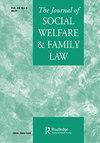扩大社会福利法的边界
IF 0.9
Q2 LAW
引用次数: 2
摘要
摘要“社会福利法”正遭受着一场长期的身份危机。该领域在英国的发展与该杂志密切相关——该杂志成立于20世纪70年代,名为《社会福利法杂志》,反映了一个新兴的研究和实践领域。然而,当时对“社会福利法”作为一个研究、教学和实践领域的含义、范围和未来方向提出的许多担忧仍未解决。正如马丁所问,“这里真的有什么值得承认的独特法律领域吗?”在重新审视社会福利法的定义问题时,本文做了两件事。首先,借鉴之前关于“社会福利法”的工作,我们提供了一种定义调查领域的方法类型。我们认为,在社会福利法的写作中,有五种方法:“法规规定”、“穷人法律”、“垃圾箱”、“案例研究”和“共同点风险”。其次,我们对未来社会福利法研究如何拓展其边界进行了两次反思。我们主张:(i)“全球”社会福利法奖学金,以及(ii)对非国家行为者进行分析。本文章由计算机程序翻译,如有差异,请以英文原文为准。
Expanding the boundaries of social welfare law
ABSTRACT ‘Social welfare law’ is suffering from a longstanding identity crisis. The field’s development in the UK is tied closely to that of this journal – its foundation in the 1970s as the ‘Journal of Social Welfare Law’ reflected a burgeoning area of research and practice. However, many of the concerns raised at the time about the meaning, scope and future direction of ‘Social welfare law’ as an area of research, teaching and practice remain unresolved. As Martin asked, is there ‘really something here which deserves recognition as a distinct field of law?’ In revisiting social welfare law’s problem of definition, this article does two things. First, drawing on prior work on ‘Social welfare law’, we provide a typology of approaches to defining the field of inquiry. We argue that there are five approaches reflected in writing on social welfare law: ‘statutes specify’, ‘law for the poor’, the ‘dustbin’, the ‘case study’ and ‘common denominator risk’. Second, we draw two reflections about how future social welfare law research can expand its boundaries. We argue for: (i) a ‘global’ social welfare law scholarship, and (ii) analysis that accounts for non-state actors.
求助全文
通过发布文献求助,成功后即可免费获取论文全文。
去求助
来源期刊
CiteScore
2.00
自引率
13.30%
发文量
52
期刊介绍:
The Journal of Social Welfare & Family Law is concerned with social and family law and policy in a UK, European and international context. The policy of the Editors and of the Editorial Board is to provide an interdisciplinary forum to which academics and professionals working in the social welfare and related fields may turn for guidance, comment and informed debate. Features: •Articles •Cases •European Section •Current Development •Ombudsman"s Section •Book Reviews

 求助内容:
求助内容: 应助结果提醒方式:
应助结果提醒方式:


